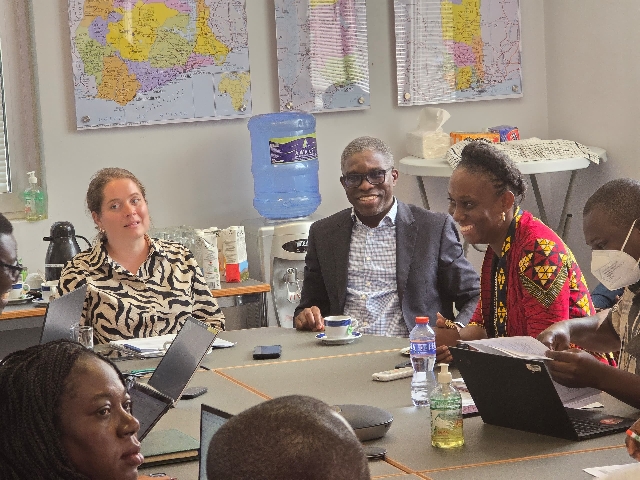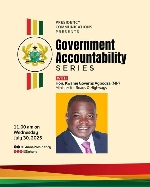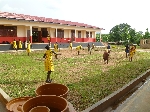Ghana engages development partners on 2026–2030 National Decentralisation Policy
 Dr. Gameli Kewuribe Hoedoafia engaging stakeholders on National Decentralization Policy
Dr. Gameli Kewuribe Hoedoafia engaging stakeholders on National Decentralization Policy
In a significant move toward shaping Ghana’s next phase of decentralisation reforms, the Inter-Ministerial Coordinating Committee on Decentralisation (IMCC) has held high-level consultations with Development Partners (DPs) as part of the drafting process for the National Decentralisation Policy and Strategy (NDPS) 2026–2030.
The engagement, led by Dr. Gameli Kewuribe Hoedoafia, Executive Secretary of the IMCC, took place at the Embassy of Switzerland in Accra and forms part of broader stakeholder consultations to ensure the new policy reflects national priorities and international best practices.
Welcoming the delegation, Janine Walz, Head of Cooperation at the Swiss State Secretariat for Economic Affairs (SECO) and Deputy Head of Mission, commended the Ghanaian government for its inclusive approach.
“Ghana is walking the talk by bringing stakeholders together for meaningful policy dialogue,” she said, adding that the upcoming decentralisation strategy presents an important opportunity for Development Partners and international NGOs to shape a reform-oriented and practical local governance framework.
Dr. Hoedoafia emphasised that the draft NDPS is the product of extensive national consultations, including four zonal sub-national meetings and a national stakeholder forum with Ministries, Departments and Agencies (MDAs), civil society organisations, and local authorities.
He said the input from Development Partners was crucial to ensure the policy aligns with Ghana’s development aspirations and global support frameworks.
“Your perspectives are key to shaping a consensus-driven policy that is both locally relevant and internationally aligned,” Dr. Hoedoafia noted.
Decentralisation remains a cornerstone of Ghana’s governance structure, aiming to empower local government authorities to deliver services and spearhead development initiatives at the grassroots level.
The meeting brought together representatives from a wide range of institutions, including:
KfW Development Bank
Agence Française de Développement (AFD)
GIZ
UK Foreign, Commonwealth & Development Office (FCDO)
UNCDF
Federation of Canadian Municipalities
World Bank
Embassy of the Federal Republic of Germany
Expertise France
UNDP
European Union
Government of Canada
Ministry of Foreign Affairs of Denmark
And other international development partners.
The IMCC is expected to incorporate feedback from the consultation before submitting the final draft of the NDPS to Cabinet for approval in August 2025.
Once approved, the 2026–2030 National Decentralisation Policy is expected to guide Ghana’s efforts in enhancing local governance, promoting service delivery at the grassroots, and strengthening partnerships between government and development actors.
Source: Classfmonline.com/Cecil Mensah
Trending News

President Mahama orders nationwide integration of new security and E-gate systems at airports and borders
12:09
Ghana must intentionally build indigenous agribusiness icons - Agri-Impact CEO
17:07
C/R: Presbyterian Minister urges Ghanaians to embrace customs, culture and traditions
14:18
Roads Minister unveils Mahama’s road agenda at Gov't Accountability Series
09:09
Young Executive CEO honoured with two International awards at Champions of Asia 2025 in Malaysia
15:16
Police uncover international car theft syndicate smuggling stolen vehicles into Ghana
11:52
Ghana donates 40 metric tons of cocoa products to Palestine amid Gaza humanitarian crisis
15:34
O/R: 846 final-year SHS students set to return after Nkwanta clashes
13:53
MoH pays salaries of 321 pharmacist interns, assures rotation nurses and allied health interns of imminent payment
08:44
Attorney-General emphasises asset recovery over prolonged trial in Unibank case
12:47



